- tucson@aaanimalcontrol.com
Call 24/7 for a free quote:
520-867-4440
Tucson AZ Wildlife Information
Arizona Wildlife Commission: 602-942-3000
 If you have any questions about the wildlife of Tucson, you can contact the Arizona Wildlife Commission,
sometimes called the Arizona Fish & Wildlife Agency. Arizona game wardens address many wildlife management matters, from hunting licenses, to poaching, endangered species, and Tucson wildlife management.
They deal with wild animals outside the range of a pest control company, such as cougars or bears. If you have a problem with nuisance wildlife in Tucson like squirrels, snakes, bats, or raccoons,
the state agency is very unlikely to help. You need to hire a private company (here are their prices) such as Tucson Wildlife Removal at 520-867-4440.
If you have any questions about the wildlife of Tucson, you can contact the Arizona Wildlife Commission,
sometimes called the Arizona Fish & Wildlife Agency. Arizona game wardens address many wildlife management matters, from hunting licenses, to poaching, endangered species, and Tucson wildlife management.
They deal with wild animals outside the range of a pest control company, such as cougars or bears. If you have a problem with nuisance wildlife in Tucson like squirrels, snakes, bats, or raccoons,
the state agency is very unlikely to help. You need to hire a private company (here are their prices) such as Tucson Wildlife Removal at 520-867-4440.
I also have listed several sources for free Tucson wildlife help. One example, if you've found an injured animal or lost baby bird or other baby animal is the Tucson Wildlife Rehabilitation Clinic: 520-743-0217 Or just read below for more info about the wild animals of Tucson.
Types of Wildlife and Animal Problems in Tucson, AZ
Arizona State bird: Cactus wren
Arizona State mammal: Ringtail cat
Arizona State reptile: Arizona ridge-nosed rattlesnake
Arizona State amphibian: Arizona tree frog
Arizona State fish: Arizona trout
Arizona State insect: Two-tailed swallowtail
Arizona is a place of dry heat. The summers are hot and the winters are mild. Forests consist of water-conserving pines trees and spruces. Though much of the state is arid, there are many deep canyons as well as the San Francisco Mountains where snowfall and more moderate weather are common. Only 15 percent of this state is privately owned. The other 85 percent is made up of national forest and Native American reservation land. The southern zone of Arizona is desert land filled with rock formations and plants like cacti. The Colorado plateau, up in the northern region, is more heavily forested. The state boasts such landmarks as the Grand Canyon and Meteor Crater.
Arizona has a unique mix of wildlife due to the forests and the desert regions in the state. The Grand Canyon has an abundance of wildlife since it is a source of constant water. Along the canyon, wolves, condors, bald eagles and mountain lions all hang out near the life-providing water. The Grand Canyon also is home to a number of endangered species including the desert tortoise, California brown pelican, bighorn sheep, Southwest river otter, and the spotted bat.
Predators in Arizona include the big four: mountain lions, black bear, wolves, and coyotes. These large carnivores are followed up by bobcats, called "wildcats" by natives.
Another creature common in Arizona is the ringtail cat. Contrary to popular belief, the ringtail cat isn't a cat at all-it is closer to the raccoon in description. Ringtails are exceptional climbers and live along cliffs in the arid or semi-arid zones within the state. They eat a variety of insects, scorpions, and smaller mammals.
Animals living in the hot Arizona desert need to be able to withstand temperatures up to 120 degrees Fahrenheit. These desert animals include scorpions, great horned owls, golden eagles, Gila monsters, and rattlesnakes.
This state does have the common nuisance animals found around the country. Raccoons are found in the pine forests of the north along with skunks, porcupines, squirrels, mice, and rats. Arizona also has a large bat population with a handful of different species. Whitetail prairie dogs have made their presence known in the arid regions and are a vital food source for many of the desert-dwelling predators. Arizona also has large grazing animals like mule deer, bighorn sheep, elk, and white-tailed deer.
If you need a professional wildlife trapper in Tucson, AZ call Tucson Wildlife Removal: 520-867-4440
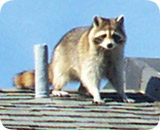
Tucson Raccoons:
This masked animal is fairly common in Tucson, AZ. They frequently raid trash cans and steal pet food. They also often choose to live in the attic or chimney of your home. One of Arizona's beautiful animals, but often a nuisance. We offer Tucson raccoon removal.
Tucson Squirrels:
Squirrels are often a pest in Tucson. They love to live in an attic, and will chew on wood or electrical wires. They are agile creatures, and live throughout the state of Arizona. Call Tucson Wildlife Removal if you need squirrel removal in Tucson.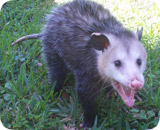
Tucson Opossum:
You may spot this animal in Tucson at night time, perhaps rooting through your garbage. This opportunistic animal will take your pet's food or live under your porch. The possum is a great Arizona survivor, and not all that ugly.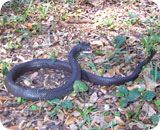
Tucson Snakes:
There are many species of snakes in Tucson, but few are venomous. If you need help identifying snakes of Arizona, browse this site or give us a call at 520-867-4440. We at Tucson Wildlife Removal can provide Tucson snake control any time you need us.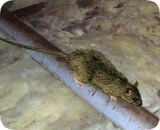
Tucson Rat Control:
The Norway Rat, Roof Rat, and House Mouse inhabit most areas of North America that people inhabit, including most Arizona cities. They contaminate food and love to live in the walls or attic of a home. Tucson Wildlife Removal can get rid of them once and for all.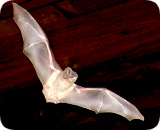
Tucson Bats:
Bats are special animals, and found throughout Arizona. They are good creatures and eat a lot of insects, but if you have an infestation of bats in your home or building, you can give us a call for professional Tucson bat removal and control.REPORT WILDLIFE ISSUES: 520-243-5900
To report a dead animal on the road, an injured bird, a lost baby squirrel, a dangerous bear, or anything like that, call animal services at 520-243-5900
If they can't help, call the Arizona Wildlife Commission at 520-243-5900. You can also call your local sheriff department at 520-243-5900 - they often deal with public wildlife issues.
We are experts with all kinds of AZ wildlife and are familiar with the wild animals native to Tucson. If you need Tucson pigeon control, geese or other bird removal, we can help. We are experts with skunks and
skunk problems, digging animals such as moles, armadillos, & groundhogs, and we offer Arizona beaver control and removal. Tucson Wildlife Removal also provides dead animal removal services. 520-867-4440
Tucson Wildlife Tip
What's The Truth About Rodents Flying? - When people think about rodents invading their attic or homes they generally think of the ordinary grey rodent. However, flying rodents are also known to come into homes and since they prefer to live in a colony you can be sure that if you have one flying rodent you will, no doubt, have many more. Flying rodents differ from their non-flying rodent cousins in that they are nocturnal. This means that when conducting the necessary detective work prior to evicting the pests you will need to spend a few nights watching their comings and goings.
Flying rodents are as difficult to get rid of as regular rodents and the only guaranteed way of doing so is by using traps - and then either humanely killing the animals or releasing them far away from your property in order to avoid them coming back in - which they will be desperate to do. Once rodents, flying or otherwise, find a warm, safe place to store their food and raise their young, they are extremely difficult to get rid of. You will need to either trap and remove them or exclude them from your attic, often both are necessary. If trapping and releasing make sure to do so far away from your home and check with laws regarding releasing flying rodents.
Tucson, AZ Wildlife News Clip:
Ariz. researchers to study urban coyotes
TUCSON, Ariz. -- State and university researchers plan a detailed study on urban neighborhoods that have become hot spots for coyotes. Coyotes, which have been setting up dens in the bushes of two neighborhoods here, will be captured and radio-collared by the Arizona Game and Fish Department and University of Arizona researchers.
They hope to trap 10 coyotes early next month to determine where the animals go and how they behave. A resident in one of the affected neighborhoods said coyotes have started following her. Recently, six coyotes ran after Holly Gardner and her dog. "They followed me to the arroyo. They all stood and looked at me, I yelled at them, turned away, pulled the dog away and we started walking home," Gardner said. "They started walking after me and I kept looking over my shoulder. They started to jog after me and I ran into my driveway." She bought an air horn to ward them off in future encounters.
After studying the first group of coyotes in the neighborhoods, researchers hope to trap another group and then move them away from urban areas to see how they act in a more natural environment. The study is expected to take two years. Arizona has an abundance of wildlife, and Tucson is no exception.
Elisa Osterg, Game and Fish's urban wildlife biologist in Tucson, said researchers hope the information they get will help diminish future conflicts between coyotes and people. The study also will help determine whether aggressive coyotes can successfully be moved to the wild. A University of Arizona researcher doubts it.
"If we have a problem animal, my personal belief is that it is better to go ahead and euthanize them," said Paul Krausman, a UA natural resources and wildlife ecology professor who is helping run the study. "That's because if you take an animal and put it into another area, it will be stressed, more vulnerable, not accepted and probably won't live anyway. You will also be stressing other animals." Although several species of wildlife roam Tucson, only a few, such as raccoons and squirrels, are considered pest wildlife.
Critter Problem at Your House? Hire Tucson Wildlife Removal
Wildlife removal is not a free service.
 If you have a Tucson wildlife problem and need help, call Tucson Wildlife Removal at 520-867-4440. They provide professional wildlife control for both residential & commercial customers in the
city of Tucson. They offer custom Tucson wildlife control
solutions for almost any type of wildlife problem, whether
it be the noises of squirrels running through the attic, a colony of bats living in a building, or
the destructive behavior of a raccoon, they have the experience and the tools to quickly and professionally
solve your wild animal problem in Pima County in Arizona. Check their prices, and for a consultation, give them a call at 520-867-4440
If you have a Tucson wildlife problem and need help, call Tucson Wildlife Removal at 520-867-4440. They provide professional wildlife control for both residential & commercial customers in the
city of Tucson. They offer custom Tucson wildlife control
solutions for almost any type of wildlife problem, whether
it be the noises of squirrels running through the attic, a colony of bats living in a building, or
the destructive behavior of a raccoon, they have the experience and the tools to quickly and professionally
solve your wild animal problem in Pima County in Arizona. Check their prices, and for a consultation, give them a call at 520-867-4440
Second in Arizona size to only Phoenix; Tucson has about half a million people and is located in the southern part of the state, 135 miles southeast of Pheonix. Tucson is surrounded by four major suburbs including Oro Valley and Marana, which are northwest of the city, and South Tucson and Sahuarita, which are to the south. Tucson is considered the longest inhabited area in the United States because archaeologists believe that it was originally the home of the Hohokam Indians back around 7000 BC. Today, Tucson is a great destination for people with arthritis and respiratory illnesses due to the very hot and arid climate. Another major attraction for tourists, is the Tucson Gem & Mineral Show. It is held every February and is one of the largest fine gem and mineral shows in the world, lasting an entire 3 weeks. Tucson is also rich in museums, art collections, performing arts centers, and sports centers. We also service the towns of Ajo, Cortaro, Sahuarita and also animal control in Mount Lemmon, Topawa, Vail and pest control in Oro Valley, Marana and wild animal services in Sells, Saddlebrooke, Green Valley and wildlife management in Rillito, Arivaca, Lukeville, Catalina.
You're still reading this page? We do not operate Tucson wildlife rescue, or a Tucson zoo or nature center, or Tucson wildlife sanctuary or refuge for volunteers. We are a privately owned nuisance wildlife removal service company. If you need a pro in Tucson to solve your problem for you, call Tucson Wildlife Removal: 520-867-4440 and they can help you with your Tucson wildlife problem.








































